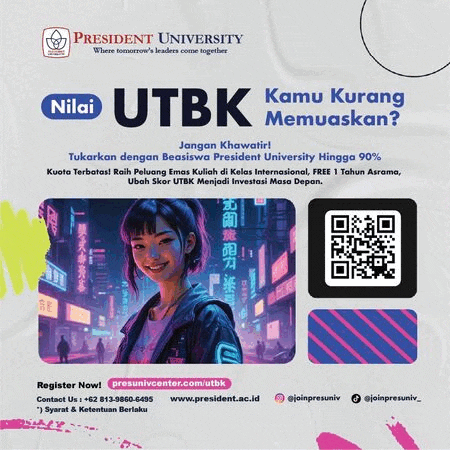Analyzing The Impacts of Artificial Intelligence in Marketing on SMEs: Insights from Ghana and Applications for Indonesia
Oleh : Fernando Saputra, Master Of Technology Management, Faculty Business, President University | Rabu, 15 Mei 2024 - 15:15 WIB

Artificial Intelligence (Ilustrasi)
INDUSTRY.co.id -In addition to numerous other technologies that are propelling global market trends, Artificial Intelligence in Marketing (AIM) brings about significant transformations for small and medium-sized enterprises (SMEs). AIM brings a redefinition of customer-business relations and enhances operational and commercial activity efficiency within an economy. This analysis is developed on a research conducted in Ghana, The Impact of Artificial Intelligence in Marketing on the Performance of Business Organizations: Evidence from SMEs in an Emerging Economy (Abrokwah-Larbi, 2023), to determine how AIM affects various performance dimensions for SMEs. Particularly noteworthy is the fact that these results might have comparable ramifications for the expanding SME sector in Indonesia.
The objective of this article is to examine the potential of integrating Personalization into AIM frameworks, Internet of Things (IoT), Collaborative Decision-Making Systems (CDMS), and Virtual and Augmented Reality (VAR), in order to enhance the operational efficiency of SMEs in Indonesia. Furthermore, this article will elaborate upon the manner in which robust data security and privacy protocols mitigate the repercussions of emergent concerns regarding data breaches and privacy infringements, thereby enhancing the sustainability and efficacy of AIM implementations. As a result, the findings obtained in Ghana establish a solid foundation for proposing tailored AIM strategies that are compliant with global data protection standards and operate effectively.
AIM Technologies and Key Business Performance Metrics
The study thoroughly outlined a number of fundamental concepts. Consequently, comprehension of numerous AIM facets was highly dependent on these variables.
Artificial Intelligence in Marketing:
1. Internet of Things (IoT): IoT is the network of devices that are connected and communicate with each other, thus exchanging data. Through IoT, AIM can collect diverse customer data in real time, which will be the basis for the business decisions and the operational efficiency.
2. Collaborative Decision-Making Systems (CDMS): CDMS are platforms that promote the merger and analysis of data from different departments, hence enhancing the process of business decisions.
3. Virtual and Augmented Reality (VAR): The tools used to create engaging customer experiences by providing creative and interactive means of interacting with products and services.
4. Personalization: Customizing marketing efforts to cater for specific preferences and requirements of particular clients, prompted by data analytics, aiming at improving customer satisfaction and retention.
Key Business Performance Metrics:
1. Financial Performance: Accounting measurement (e.g. revenue growth, return on investment, and cost efficiency) to assess the effectiveness of AIM technologies.
2. Customer Performance: Indicators (such as customer acquisition rates, retention, and overall satisfaction) that are crucial for evaluating the effectiveness of personalized marketing campaigns.
3. Internal Business Process Performance: Focuses on operational aspects (such as process efficiency, quality control, and workflow optimization), which are enhanced by IoT and CDMS.
4. Learning and Growth Performance: Measures the capability of an organization to encourage innovation and develop its workforce, important for maintaining a competitive edge in evolving markets.
Results of The Study
The research produced noteworthy discoveries regarding the influence of AIM on the performance of SMEs. The study employed Structural Equation Modeling (SEM) to examine the correlation between different AIM technologies and critical performance indicators.
Financial Performance. A robust positive correlation has been identified between the implementation of AIM technologies and an organization's financial performance. Organizations that incorporated IoT, CDMS, VAR, and Personalization experienced substantial gains in revenue growth and return on investments. Its utilization enabled marketers to enhance the accuracy of their decisions, resulting in decreased expenses for business costs and increased profitability.
Customer Performance. The AIM technologies implementation enabled them to personalize marketing strategies and improve customer interactions, resulting in a significant surge in customer engagement metrics such as satisfaction ratings and retention rates. The use of VAR enhanced the sense of immersion, which significantly increased consumer loyalty.
Internal Business Process Performance. The most significant discovery in the research was that the implementation of AIM technologies led to a reduction in operational errors and inefficiencies, thereby improving the overall efficacy of small enterprises. Certain platforms, including the Internet of Things, have facilitated the management of data and the acquisition of operational insights for businesses, thereby decreasing response time and operational costs.
Learning and Growth Performance. With the assistance of AIM tools, continuous training programs improved the competencies of personnel and encouraging an environment of innovation within organizations.
These arguments provide solid justification for other SMEs in various regions, such as Indonesia, to implement similar strategies in order to leverage technology for the purposes of growth and survival.
Application of Findings to Indonesia SMEs
The practical implications of the research conducted in Ghana for Indonesian SMEs seeking to utilize AIM technologies are illuminated by the study's findings. Indonesian enterprises can augment their performance and competitiveness in a dynamic digital marketplace by comprehending and implementing effective strategies that have been identified in the Ghanaian context.
Strategic Implementation of AIM Technologies
1. Customized Marketing Approaches: The findings indicate that Indonesian SMEs have the ability to tailor marketing messages personally through the implementation of suggested personalization techniques. This will potentially enhance customer loyalty and satisfaction, resulting in increased sales and improved customer retention rates.
2. Operational Efficiency: It is important to highlight the integration of IoT and CDMS that will optimize operational processes, reduce expenditures, and improve the quality of decision-making. Real-time monitoring of inventory levels via Internet of Things (IoT) devices, for instance, reduces waste and guarantees prompt resupply.
3. Enhanced Customer Interactions: By designing VAR interfaces, small businesses can generate engaging customer experiences. This strategy has the potential to be successful in industries such as retail and tourism, where improved customer satisfaction leads to greater customer engagement and purchases.
Adapting to Local Context
1. Regulatory Compliance: Indonesia's SME sector is governed by distinct regulations, in contrast to Ghana's. To implement AIM technologies successfully, practitioner must comply with local data protection regulations.
2. Cultural Adaptations: involve the contextualization of the marketing approach to incorporate local cultural subtleties, thereby enhancing its ability to connect with the Indonesian audience. These encompass linguistic localization in addition to cultural value or preference recognition.
By applying the findings of the Ghanaian study while modifying them to suit the specific circumstances of Indonesia, SMEs can optimize the advantages of AIM in order to improve not only their operational efficiency but also their market presence. This ensures not only the expansion of the business but also its long-term viability in the face of technological progress.
Role of Data Security and Privacy in Enhancing AIM Impact
Protecting and securing data becomes critical to AIM operations in the digital age, where data is equivalent to money. This is not only for compliance purposes, but also as a strategic asset that improves the efficiency and dependability of AIM. SMEs operating in rapidly expanding technology markets, such as Indonesia, are obligated to maintain strictly secured data bases. This not only prevents intrusions but also enhances consumer confidence, which is crucial for the effective execution of the AIM strategy.
Enhancing Customer Confidence. Trust continues to be a critical component in the realm of online client interactions. These measures are crucial for ensuring that client information is handled appropriately, thereby increasing customers' confidence and encouraging them to share more information. This results in enhanced data quality that AIM technologies can utilize for the purposes of personalization and targeting, thereby increasing customer satisfaction via increased engagement.
Regulatory Compliance Enhancement. Complying with the ever more stringent international climate regarding data protection legislation is imperative. SME compliance with local and international privacy regulations protects the companies from legal repercussions and enhances their reputation as credible entities in Indonesia. In accordance with the General Data Protection Regulation (GDPR), European countries are granted access to Indonesian markets, thereby creating fresh operational prospects for small and medium-sized enterprises (SMEs) in the region.
Consolidating Data Quality. AIM systems require precise data to operate effectively. By effectively managing this risk, unauthorized access is thwarted by robust security measures. This ensures that the input remains reliable for organizations, thereby enhancing the predictability of AIM tools, which facilitates more informed decision-making and permits more targeted marketing campaigns.
Constructing a Secure Culture. Nevertheless, the establishment of a robust security culture extends beyond technological implementations; it necessitates thorough employee training regarding the secure handling of personal information and periodic audits to verify the implementation of safety protocols throughout the organization's hierarchy. These modifications will decrease the frequency of hacking incidents, thereby enhancing the overall resilience of organizations compromised by cyber threats.
In summary, the protection of substantial volumes of corporate data not only ensures the integrity of any routines but also increases the overall efficacy of the approach when SMEs are involved. By allocating resources towards these domains, organizations enhance their operational capacities and adherence to regulatory obligations, thereby gaining a competitive edge in the digital economy.
Conclusions
The research on AIM conducted in Ghana provides essential knowledge for Indonesian SMEs seeking to leverage these technologies to enhance their market performance. The study illustrates the substantial improvements that AIM can bring about in terms of customer engagement, operational efficiency, and financial outcomes. Moreover, this necessitates the integration of a robust data security policy and privacy protocols that not only comply with legal obligations but also undermine consumer trust—a critical component for the effective execution of technology-driven marketing strategies. In conclusion, facilitating the comprehension of these groundbreaking technologies and their underlying principles among Indonesian SMEs will be crucial in effectively navigating intricate digital marketing landscapes and attaining a competitive advantage on an international scale. This approach suggests that SMEs have the potential to flourish more effectively in a digital economy, given their ongoing expansion in a world that is becoming more data-centric.
Baca Juga
Mengamankan ‘Tulang Punggung’ Digital Indonesia dengan Solusi…
Revitalisasi Koperasi melalui Pembangunan IKN Nusantara
Analisa Apakah Ada Potensi Moral Hazard Borrower Fintech P2P Lending?…
Etika dan Tanggung Jawab Pemimpin dalam Kasus Peretasan Data
Transisi Sertipikat Tanah Elektronik: Pemerintah Harus Bijak, Jangan…
Industri Hari Ini

Sabtu, 27 Juli 2024 - 11:18 WIB
BSI Ajak 140 Anak Yatim Belanja, Ajarkan Literasi Transaksi Syariah
PT Bank Syariah Indonesia Tbk (BSI) berkolaborasi dengan 7 (tujuh) Lembaga Amil Zakat (LAZ) menyelenggarakan acara Lebaran Anak Yatim untuk berbagi kebahagiaan berupa belanja bersama di Department…

Sabtu, 27 Juli 2024 - 10:32 WIB
Waskita Karya Ungkap Progres Bendungan Jlantah dan Jragung
Direktur Utama PT Waskita Karya (Persero) Tbk Muhammad hanugroho didampingi Direktur Operasi II Waskita Karya Dhetik Ariyanto mengunjungi lokasi pembangunan Bendungan Jlantah dan Jragung di…

Sabtu, 27 Juli 2024 - 09:44 WIB
Kemenag RI Menyerahkan SK Izin Operasional Sebagai Lembaga Amil Zakat Skala Nasional Kepada YBM BRILiaN
Yayasan Baitul Maal BRILiaN atau YBM BRILiaN telah memperoleh kembali izin operasional sebagai Lembaga Amil Zakat (LAZ) Skala Nasional berdasarkan Keputusan Menteri Agama Republik Indonesia…

Sabtu, 27 Juli 2024 - 09:10 WIB
Dirut Kideco: Perusahaan Tambang Harus Berikan Kesempatan yang Sama Terhadap Perempuan
Direktur Utama PT Kideco Jaya Agung (Kideco), Mohammad Kurnia Ariawan mengatakan, pekerjaan tambang, tidak lagi menjadi pekerjaan yang harus didominasi oleh laki-laki. Menurutnya, kini perusahaan…

Sabtu, 27 Juli 2024 - 08:18 WIB
Penuhi Kebutuhan Lifestyle, Bank Mandiri Luncurkan Mandiri Lippo Malls Card dan Solusi Valuta Asing
Bank Mandiri bersama Lippo Malls, anak perusahaan Lippo Group memperkuat kolaborasi dengan meluncurkan kartu kredit co-branding Mandiri Lippo Malls Card. Lewat inovasi ini, diharapkan dapat…

















Komentar Berita